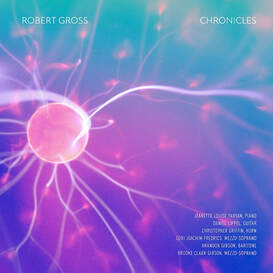 Robert Gross’ new album Chronicles, released in late May by New Focus Recordings, is a fascinating album that brings the synthesizer to the forefront in an approach not commonly found in the modern landscape of avant-garde electronic and electroacoustic. Clocking in at just over 134 minutes, Chronicles presents a collection of tracks from Gross’ Chronicles series of compositions - pieces for either synthesizer alone or synthesizer with instruments. These pieces take up about 80 minutes of the album, with the remaining time dedicated to a freestanding piece called Nothing Has Changed and a 40-minute one-act opera called Dissonance, for two singers and synthesizer. My initial commentary is that it is a lot to take in - definitely not an album that can be easily digested in a single sitting - but an album I found myself wanting to return to frequently after my first pass. Because there is so much material on this album I’ve decided to discuss it more in broad strokes rather than a treatment of each composition and track on the album. Overall, I’m wholly impressed with what Gross and his collaborating musicians and engineers accomplished with this album. The logistics of putting together a collection of tracks and organizing all of the production for even a short EP is an undertaking, and Chronicles is that amount of work on steroids. The fact that the tracks were recorded by different engineers is impressive as well, considering the album does have a very homogenous sound overall. The role of the synthesizer in creating that homogeneity shouldn’t be understated, either. The liner notes describe the album as “pitch-determinate electronic works written for one synthesizer” and in this case, that one synthesizer is Native-Instruments Absynth - a staple of the electronic music and sound design worlds. Anyone with an interest in modular synthesis and the hours of tinkering that go into working with hardware synthesizers could scratch that same itch with an instrument such as Absynth, a semi-modular setup in the software domain that offers equally limitless possibilities in terms of timbre and ability, and Gross exploits those capabilities from start to finish. Cultivating an intimate understanding of the subtleties and nuances of a hardware or modular synthesizer can be lost easily when switching to the digital domain. There’s something that just isn’t quite as satisfying as manually inserting patch cables and slowly turning knobs to get just the right sound. And the allure of hundreds of presets is tempting. But software synthesizers, just like any other instrument, require the performer to take the time to understand the instrument, to know its strengths and limitations, and how to use it to achieve one’s artistic goals. That isn’t to say you can’t get some really killer sounds out of Absynth by clicking a few buttons and holding middle C to infinity, but the appeal can wear off quickly. That’s not what Gross has done with Chronicles. It is clear that regardless of how the synthesizer patches were created, Gross has that deep understanding of his instrument, and it comes through in how the timbres he chooses blend well with the live musicians, that his textures aren’t so oversaturated with overtones that layers are lost, that time-varying parameters of complex sounds are morphing in ways that generate interest and draw the listener in without being so busy that the aural impact and affect is lost. If you’re a person who loves to listen to electronic music created by someone who truly understands how to harness the performative power of synthesizers, this is a good album for you to check out. And if you’re a person who is skeptical that modern digital synthesizers don’t stand up to the classic workhorses, this album is for you, too. That leads me to my next point on another cornerstone of Chronicles - nostalgia. It’s a bit ironic to refer to an album as sounding nostalgic while also talking about its references to two of Modernism’s biggest names, those being Babbitt and Wuorinen. Gross’ liner notes also mention the influence of those mid-century electronic music pioneers, and I think that influence can be heard instantly. When I first put the album on I hadn’t ready anything about it, and the sounds of Absynth and Jeanette Yaryan’s piano playing immediately brought up references to Davidovsky’s Synchronisms VI, but different. In Dressing Station (Chronicles XVII) it’s difficult to not hear flashes of Philomel, but there’s something different. And in the 30-minute tour de force Chronicles XIV (Charles Wuorinene In Memoriam), it’s difficult to not hear the influence of, well...Wuorinen. But like I said with the others, there’s something fresh and exciting about it. Gross demonstrates a true understanding of the lineage this music was born out of, but filtered through a modern lens, one with broader possibilities in the utilization of technology in music. Take for instance the third track, Nothing Has Changed, in which Gross creates a more groove-oriented treatment of his instrument while deconstructing a looped sample of himself saying “nothing has changed.” On the surface there is a pretty clear association to Reich, but it’s not a process piece in the same manner of treatment. There are some hints at Laurie Anderson, but also of Frank Zappa’s Jazz from Hell years that blended his penchant for humor and playful dissonant melodies with modern instruments. I would also be remiss if I didn't mention the influence (whether intentional or not) of the West Coast experimentalists who did so much for the synthesizer - Pauline Oliveros, Morton Subotnik, Tony Martin and Don Buchla. That isn’t to say Gross’ clear influence makes this a wholly nostalgic or unoriginal album. Quite the contrary, I find all of the direct influences mentioned to be ones that can be easily heard on the surface if one knows that repertoire, but Gross’ pieces themselves sound quite fresh. I think the intentional use of Absynth helped to solidify this album sonically, and the influence of past pioneers of the genre gave it grounding. But there is so much that references modern riff-based groove elements, the new possibilities of the digital synthesizer as a performative instrument, allusions to more popular styles like fusion and progressive rock/metal, and just a general modern sensibility of where music currently is, that makes the nostalgic elements an afterthought. What I’m left with isn’t music of the past filtered through Robert Gross, but rather Robert Gross’ continued contribution to that lineage while also forging something unique. Robert Gross’ Chronicles album is a colossal album that will have you thinking about future directions of music by reimagining its past. Credits: Other musicians featured on the album: Jeanette Louise Yaryan (piano), Dan Lippel (guitar), Christopher Griffin (horn), Lori Joachim Fredrics (mezzo-soprano), Brandon Gibson (baritone), Brooke Clark Gibson (mezzo-soprano) Recording Engineers: Michael J. Quick (Idyllwild Arts Academy) [track 1], Ryan Streber (Oktaven Audio) [track 2], Robert Gross [tracks 3, 4, 5 and 7], Christopher Griffin [track 4], Howard Fredrics [track 6], Brandon Gibson, Brooke Clark Gibson, and Robert Gross [track 7] Link to the album: https://www.newfocusrecordings.com/catalogue/robert-gross-chronicles/ Link to Robert Gross' website: https://www.robertgrosscomposer.com/
0 Comments
Leave a Reply. |
Reverberations is a catch-all page for everything that doesn't fit into a neat and tidy box of blog posts and interviews. Enjoy!
Full Directory of Reviews |

